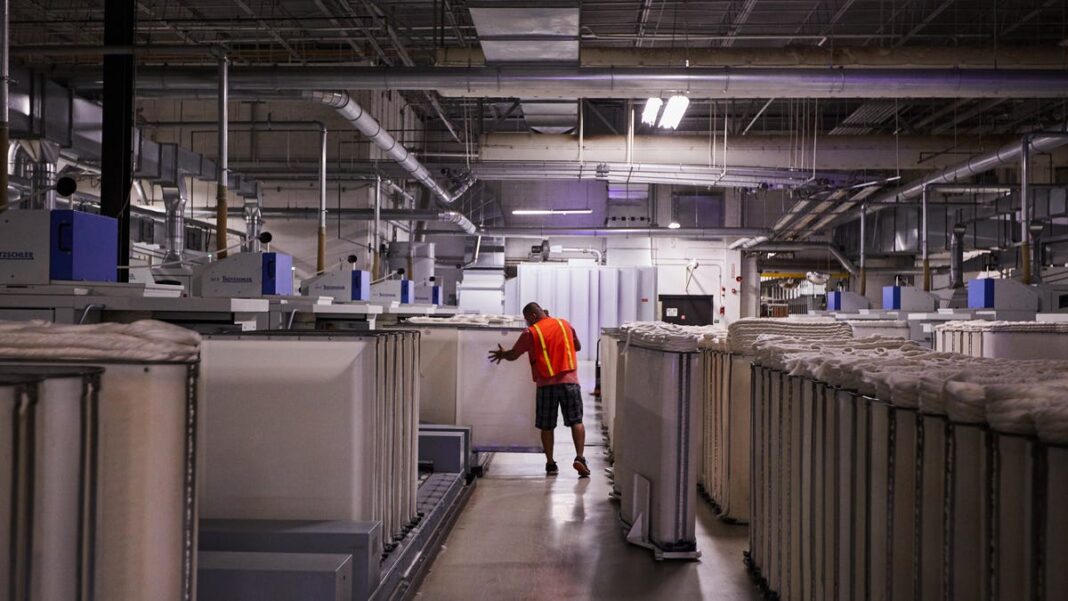Trump is calling for more tariffs: What it could mean for American manufacturers.
President-elect Donald Trump is promising to revive U.S. manufacturing as he returns to the White House by implementing tariffs that support domestic companies producing goods in America.
The intention behind these tariffs is to raise the cost of imported products, making American-made alternatives more attractive. While some domestic manufacturers see this as a positive move against lower-cost imports from countries like China, economists caution that tariffs can also lead to increased inflation and higher interest rates.
“It does offer some protection” for manufacturers, explained Gary Schlossberg, a global strategist at the Wells Fargo Investment Institute. However, he added, “depending on the type of manufacturing you are in, that (inflation) could backfire.”
Worries about inflation
During his initial term, Trump imposed tariffs on items like solar panels, washing machines, and certain metals. President Joe Biden maintained most of these tariffs and even added new ones on additional Chinese imports, which include electric vehicles and semiconductors. Now, Trump is suggesting steeper tariffs ranging from 60% to 100% on Chinese goods and proposing a blanket tariff of up to 20% on imports from other nations.
“We’re going to lead an American manufacturing resurgence,” Trump told his supporters in a September address in Georgia, asserting that when companies face tariffs, they have a greater incentive to produce domestically, leading them to return to the U.S.
However, economists warn that such tariffs could increase interest rates and reignite inflation. Companies like Autozone and Stanley Black & Decker have indicated that they may pass rising operating expenses onto consumers.
The Peterson Institute for International Economics, a nonpartisan organization, estimates that the tariffs could cost the average U.S. household more than $2,600 annually. Furthermore, the National Retail Federation, a trade association, reported that these tariffs could reduce American consumers’ spending power by $46 billion to $78 billion each year. For example, $50 athletic shoes could rise to as much as $64, and a $2,000 mattress set could cost between $2,128 to $2,190, according to their analysis.
“Most experts believe that the proposed tariffs could harm the economy overall, even if they provide some temporary benefits to specific manufacturing sectors,” Schlossberg noted.
Matt Bigelow, president of Vermont Flannel, acknowledged that inflation is a major concern for his apparel manufacturing business, which uses fabric sourced from Europe to make shirts and other clothing.
“All of us have felt the impact of inflation in recent years,” he remarked in an interview with YSL News. “If tariffs increase consumer costs, that could be a significant issue.”
Stephen Liquori, founder and CEO of Massachusetts-based apparel company Goodwear USA, mentioned that while Trump’s tariff proposals could enhance his business by raising the cost of imports and leveling the playing field, he is skeptical of their benefit overall and anticipates that costs will ultimately be transferred to U.S. consumers.
“There are many products we can’t produce or don’t manufacture here, and likely never will. I recognize this reality; I’m not suggesting we should produce everything domestically,” he explained.
Positive outlook for job creation
In spite of concerns regarding inflation, several U.S. manufacturers are optimistic about the potential for increased tariffs.
“This could significantly benefit American factories across the country,” proclaimed Drew Greenblatt, president of Marlin Steel, a manufacturer of wire and sheet metal products that sources steel domestically.
Greenblatt noted that Trump’s previous 25% tariff on select steel imports had not helped his business much, as it excluded fabricated steel from China, but he remains hopeful that the new tariffs will positively impact his operations. Should the tariffs work in his favor, he anticipates needing to hire twice his current workforce of 115 employees.
“I often lose jobs to price-sensitive purchasing managers who opt for cheaper Chinese alternatives. However, I expect to regain those contracts. This will be very advantageous for the American manufacturing worker,” he stated.
A comprehensive 10% tariff could create as many as 2.8 million jobs, according to a study by the pro-tariff organization, Coalition for a Prosperous America. Another study from the nonpartisan Brookings Institution in 2020 indicated that tariffs enacted during Trump’s first term seemed to create thousands of jobs in the steel sector, but these job gains in manufacturing that competes with imports were “largely canceled out” by losses in industries dependent on foreign products or facing retaliatory tariffs on their exports.
Bayard Winthrop, CEO of apparel manufacturer American Giant, expressed support for recalibrating trade relationships with China and other trading partners through tariffs, but he advocates for a careful and deliberate approach.
If Trump were to institute a universal 20% tariff…
On the first day, Winthrop mentioned, “that would be devastating.” However, he expressed optimism, stating, “I don’t believe that’s where we will ultimately end up. Instead, I think we will see a slow and steady increase in tariffs over time, and I support that approach.”
Since its inception in 2012, American Giant, based in San Francisco, has become one of the largest clothing manufacturers in the U.S., sourcing all its materials domestically. Winthrop indicated that tariffs would not only be beneficial for the company but also provide more factory jobs for the American middle class.
He acknowledged, “(There will be) some increase in costs – that’s just the trade-off – but the upside is that it will start to establish much-needed industrial capabilities within the United States.” He emphasized the necessity for these capabilities for job creation, as well as support for middle and lower-skilled workers across the nation.
Scott Paul, president of the Alliance for American Manufacturing, also supports a careful and continued use of tariffs.
He stated, “The concept of increased tariffs on specific Chinese products makes sense, especially if we aim to minimize our economic dependence on China. It’s a critical policy measure we need to consider.”

